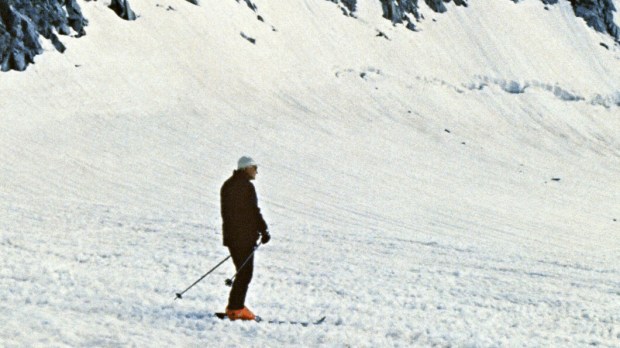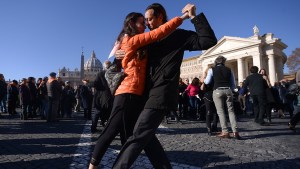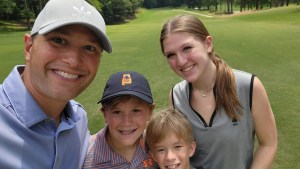“To see the Church and the Vatican invest in the Olympic Games and in sports is a wonderful initiative,” says journalist Jacques Vendroux, who is taking part in the International Summit “Sport for all,” held in the Vatican on September 29 and 30, 2022, on the initiative of the Dicastery for the Laity, Family, and Life. Approximately 250 people from about 40 countries participated. The values promoted by sports are the focus of the presentations, including that of the President of the International Olympic Committee, Thomas Bach. I.MEDIA met with several participants who spoke of their expectations and their surprise at the Church’s attention to the world of sports.
“Here at the Vatican, we’re in the house of God, and that’s wonderful. Religions have things to contribute to the world of sports. We need to bring peace to the world.” At 74 years of age, with a 56-year career as a sports journalist at ORTF, then Radio-France and now Europe 1, Jacques Vendroux, who says he is “proud to be a Catholic,” is delighted to see the Church investing in accompanying the world of sports, which has been weakened by repeated scandals.
“I, who experienced wonderful moments with the French world champions in 1998 and 2018, am upset by what’s happening,” he says. “I would never have imagined that a female soccer player could have a teammate beaten up to take her place on a soccer team, or that a world champion would be involved in multiple rape cases. With all these cases of corruption, blackmail … I was disillusioned,” he admits.
In this context of moral crisis, the Church has “an important role to play,” insists Vendroux, marked in his childhood by the faith and passion for sports of his great-uncle by marriage, General de Gaulle.
Kenyan marathon runner Tegla Loroupe, winner of the 1994 New York Marathon, explains that “in sports, we need a lot of rules, and we need religion to keep the fraternal spirit alive, to forgive each other,” even in contexts of intense individual pressure.
“When you make a false start in a race, you’re immediately disqualified; your efforts are reduced to nothing. You’re no longer a person. But religion invites us to live with each other, and for each other,” says the marathoner, who served as the organizer of the refugee team at the 2016 Rio and 2021 Tokyo Olympics. “The world today is full of displaced people and refugees. By encouraging them, we help them regain their self-esteem,” she explains.
Cardinal Bertone’s plea for the values of sports
Cardinal Tarcisio Bertone, who was the Holy See’s Secretary of State from 2006 to 2013, came to the summit as a simple sports fan. “Sports have very ancient roots in the Church,” he told I.MEDIA. “St. Paul himself was a great expert on sports; he was very familiar with the Olympics, the techniques of sports … It’s interesting to see, for example, how he describes wrestling, an important sport of the Olympics,” he notes.
A member of the Salesian congregation, which runs many schools, Cardinal Bertone said that “the Church has always seen the importance of sports, especially in the education of young people. Sports contain values that can form people in the physical dimension, in the care of their body, but also in the care of their spirit, of their psychology, with the social virtues of competition: respect for others, and reciprocal help, especially for the weakest and those with disabilities.”
The former Secretary of State during the pontificate of Benedict XVI, who founded the Clericus Cup (a soccer tournament among the seminaries of Rome) has just published a book in Italian entitled Credere nello sport (“Believe in sports”). He has collected testimonies from many champions on the link between faith and sports.
“We saw that in the history of the popes, from the discourses of Pius XII to the love of Pope Francis for the Vatican sports team and the impetus he’s given to make it grow, there’s a strong alliance between the Church and sports. It’s a very positive concurrence that helps society to progress,” says the 87-year-old cardinal, who, unusually for a clergyman, used to comment on soccer matches on the radio when he was archbishop of Genoa. He also shared with us his enthusiasm for the example of integration offered by the players on the French team during their victories in the 1998 and 2018 World Cups.
The Olympic Games, a tool of evangelization?
Isabelle de Chatellus, director of the “Catholic Church of France and Olympic Games” project, came to the Vatican to enrich her reflection on how the Church will be able to “be present in this festive time” of the Paris Olympics in the summer of 2024. She identified four “lines of work” inspired in the words of Pope Francis in a message published in 2018, in which he expressed his desire that sports be “an instrument of encounter, formation, mission, and sanctification.”
The organization of a Mass for the opening of the Olympic Games is being studied. De Chatellus is pleased that the members of the Organizing Committee of the Olympic Games have listened attentively to her and suggested that the Mass be held one week before the official opening of the competitions, in order to “mark the beginning of the Olympic truce. In a context of war, that would make a lot of sense,” she adds. She specifies that this Mass could be held at the basilica of Saint-Denis, near the Olympic village and the Stadium of France, “which would be an important sign to foster fraternity.”
Among other projects related to the Olympic Games is the establishment of a parish dedicated to athletes in Paris. The church of La Madeleine, a gathering place for fans of French rock and roll legend Johnny Hallyday since the singer’s highly publicized funeral in 2017, could also become the athletes’ church as early as September 2023, when the Rugby World Cup opens.
The Catholic Church in France, which maintained a relatively low profile during the 1998 World Cup, now intends to use these international events as opportunities for pastoral creativity, in order to support the athletes as well as the spectators who come from all over the world in search of moments of fervor and communion.



